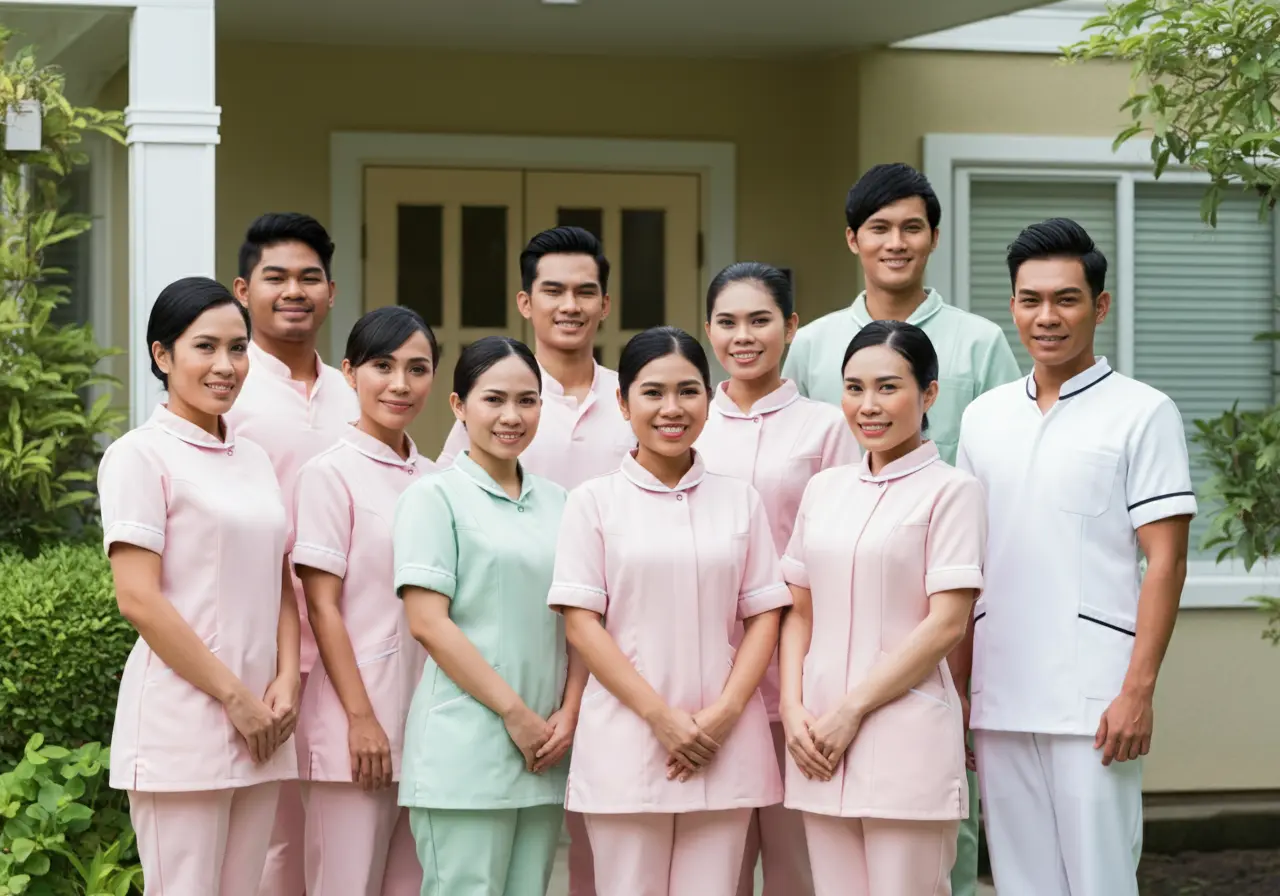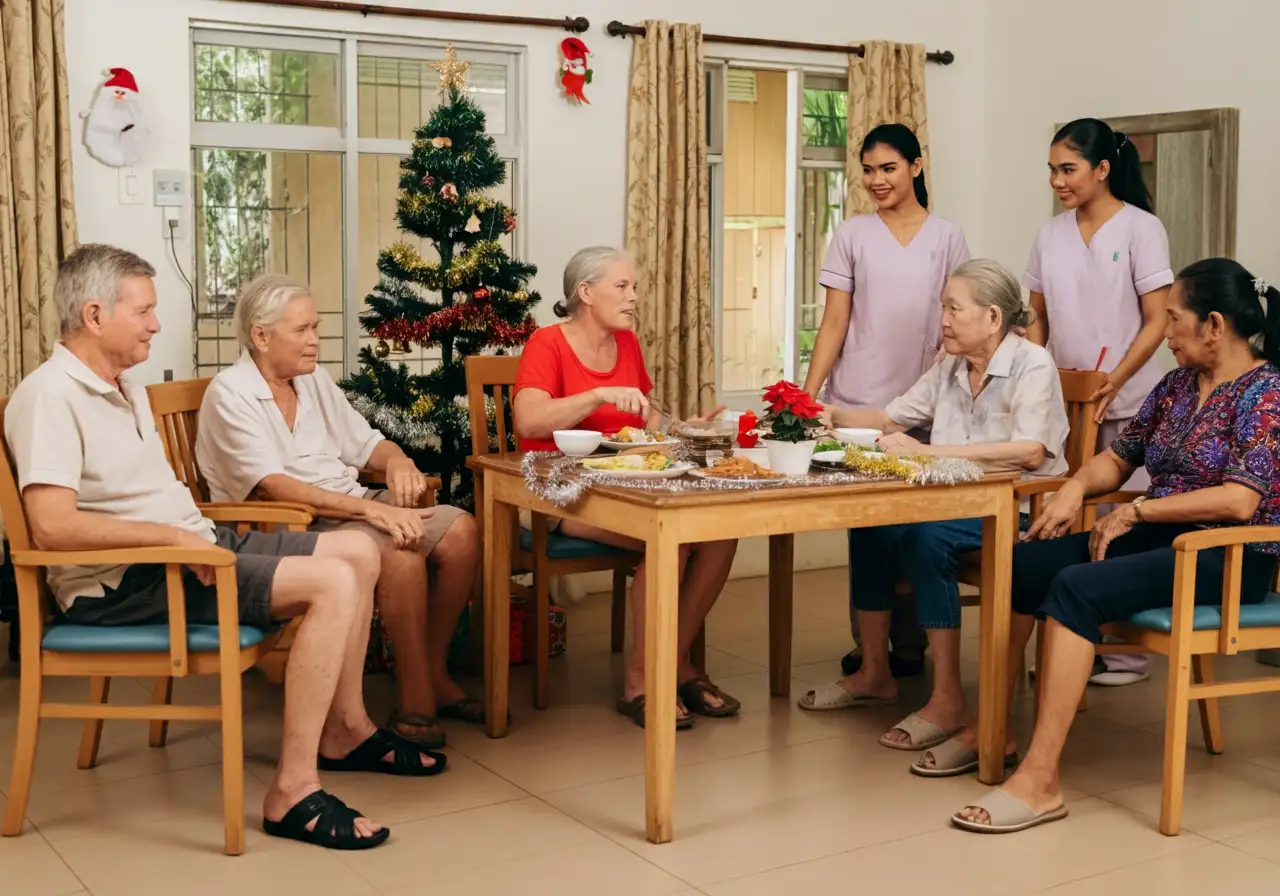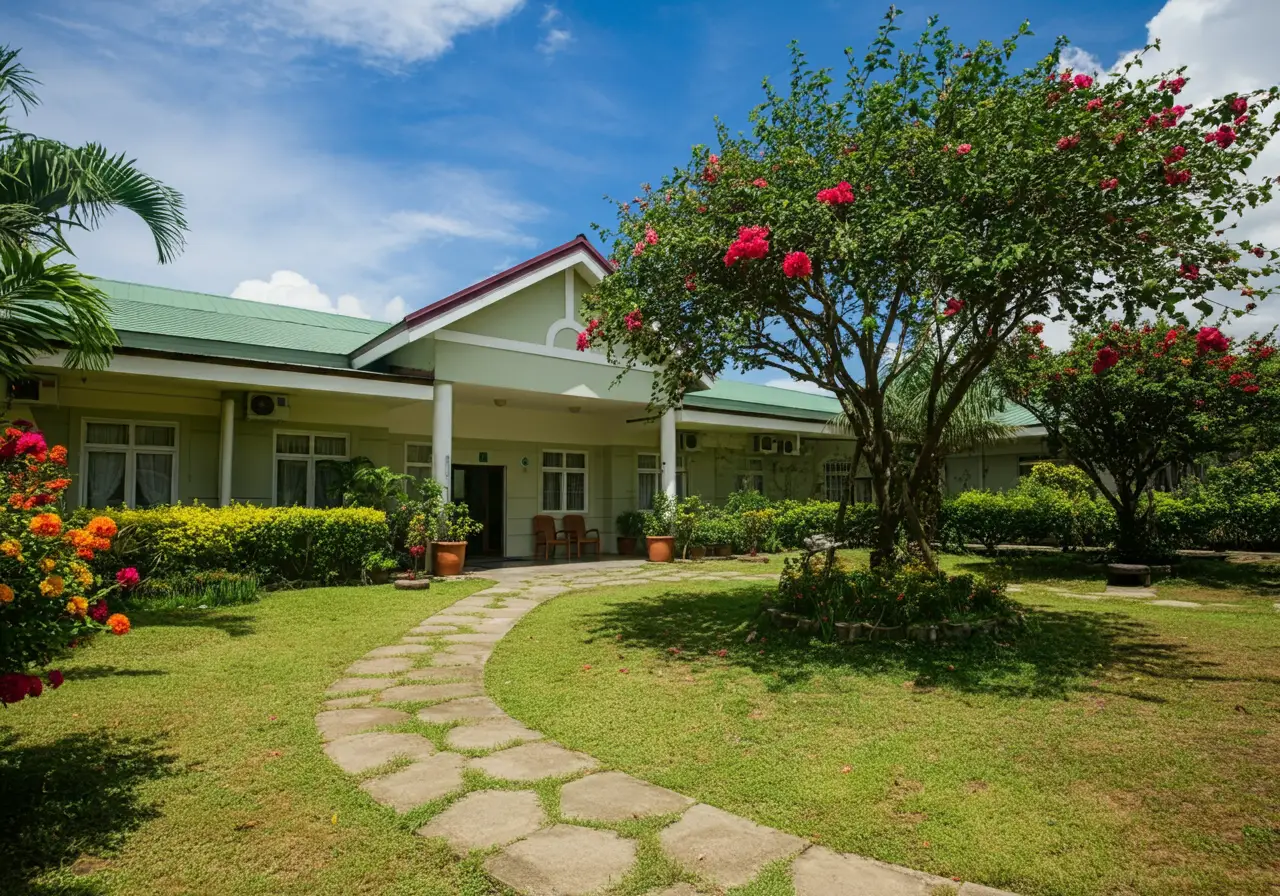Top concerns when choosing nursing homes in the Philippines
Making the decision to find a nursing home for a loved one with dementia is challenging, especially when considering options abroad. The Philippines offers warm hospitality, high-quality services, and more affordable care options compared to Western countries. However, it's natural to have concerns about making such a significant move.
In this guide, we'll address the top concerns families often have when considering nursing homes in the Philippines:
Quality of Care

Compassionate and Personalized Attention: Nursing homes in the Philippines are dedicated to providing compassionate, individualized care for residents with dementia. They focus on creating a nurturing environment where each person feels valued and supported.
Low Nurse-to-Resident Ratios: One standout feature of Philippine nursing homes is their low nurse-to-resident ratios. Facilities often offer ratios such as 3:1, 2:1, or even dedicated 1:1 care. This means:
- Personalized Care: Nurses have ample time to attend to each resident's unique needs and care plans.
- Enhanced Safety: Closer monitoring reduces the risk of falls and unnoticed medical issues.
- Stronger Relationships: Residents build deeper connections with their caregivers, fostering trust and emotional well-being.
Nurse-to-Resident Ratios: Philippines vs. Western Countries
Understanding the nurse-to-resident ratio is crucial in evaluating the quality of care provided in nursing homes. A lower ratio ensures more personalized attention, enhanced safety, and stronger relationships between caregivers and residents.
Key Takeaways
- check_circlePersonalized Care: Lower ratios allow nurses to attend to each resident's unique needs.
- check_circleEnhanced Safety: More nurses ensure better monitoring and quicker response times.
- check_circleStronger Relationships: Residents build deeper connections with their caregivers.
Why Lower Ratios Matter
Maintaining lower nurse-to-resident ratios significantly impacts the quality of care, patient satisfaction, and overall safety within nursing homes. It ensures that each resident receives the attention and support they need, fostering a healthier and more nurturing environment.
Sources: Department of Health, Nursing Home Accreditation Board, International Healthcare Statistics 2024
Contrast with Other Countries: In many Western countries like the USA, UK, Australia, Switzerland, and Germany, nurse-to-resident ratios are higher. For example:
- USA: Facilities may have one nurse for every 20-30 residents.
- UK: Ratios can be around 1 nurse to 20 or more residents.
- Australia: Ratios vary but can be estimated at 1 nurse to 15-30 residents.
- Switzerland and Germany: Ratios of 1 nurse to 20-30 residents are common.
Holistic Care Approach: Philippine nursing homes emphasize not just physical health but also mental and emotional well-being. Activities are designed to stimulate cognitive function, encourage social interaction, and promote overall happiness.
Staff Qualifications and Training

Highly Educated and Internationally Recognized Nurses: Nurses in the Philippines receive rigorous education through four-year bachelor's degree programs taught in English. Their training aligns with international standards, ensuring they are well-equipped with medical knowledge and practical skills.
Global Recognition:
- International Employment: Many Filipino nurses work abroad in countries like the USA, Australia, the UK, and Canada, reflecting the global acceptance of their qualifications.
- Licensing Success: They often pass international licensing exams such as the NCLEX-RN (USA), demonstrating their competency and readiness to practice internationally.
Abundance of Qualified Staff:
- Nurses and Caregivers Working Together: Facilities employ both licensed nurses and trained caregivers. Nurses focus on medical care, while caregivers assist with daily activities and provide companionship.
- Comprehensive Support: This team approach ensures residents receive both professional medical attention and personal assistance.
Specialized Dementia Care Training: Staff members receive ongoing training in the latest dementia care techniques, enabling them to manage symptoms effectively and provide appropriate support.
Medical and Emergency Support

Immediate Medical Attention: With a high number of registered nurses on-site and exceptionally low nurse-to-resident ratios, nursing homes in the Philippines provide immediate medical attention whenever needed. This ensures that any health concerns are promptly addressed, enhancing residents' safety and well-being.
Regular Health Assessments and Personalized Care Plans: Residents receive regular health assessments conducted by skilled nurses. Based on these assessments, personalized care plans are developed and continually updated to maintain optimal health. This proactive approach helps in early detection and management of potential health issues.
Frequent Doctor Visits: Medical doctors visit the nursing homes frequently, often more regularly than in Western nursing homes. Depending on residents' needs, doctors may visit anywhere from once to several times a month. This frequent medical oversight ensures timely interventions and consistent monitoring of health conditions.
Access to Reputable Hospitals: Nursing homes are strategically located near reputable hospitals and medical centers. In case of emergencies, residents can be swiftly transferred to these facilities for advanced medical care.
Partnerships with Hospitals: Many nursing homes have established agreements with local hospitals. These partnerships facilitate smoother processes during hospital transfers, including expedited admissions and coordinated care. They also assist with paperwork and insurance claims, reducing administrative burdens on families.
Emergency Preparedness: Facilities are equipped with comprehensive emergency response systems and protocols. Staff are trained to handle urgent situations efficiently and effectively, ensuring residents receive immediate assistance during emergencies.
Language, Communication, and Cultural Compatibility

English Proficiency: English is one of the official languages of the Philippines and is widely spoken and understood. This makes communication smooth and reassuring for residents from English-speaking countries.
Cultural Sensitivity and Inclusivity: Nursing homes prioritize respecting residents' cultural backgrounds, traditions, and preferences. They often celebrate international holidays and incorporate familiar customs into daily routines.
Family-Oriented Care Philosophy: Filipino culture places a strong emphasis on family values and respect for elders, which translates into compassionate care and a warm, welcoming environment for residents.
Multilingual Capabilities: Some staff members may also speak other languages, catering to a diverse population and minimizing language barriers.
Distance from Home and Staying Connected

Direct Communication with Nursing Staff: The low nurse-to-resident ratios allow families to have direct contact with the nurses caring for their loved ones. This close relationship enables:
- Regular Updates: Families can easily reach out via messaging apps or phone calls to receive timely updates.
- Personalized Communication: Nurses are readily available to discuss concerns or changes in health status.
Technology for Connectivity:
- Video Calls and Messaging Apps: Facilities often provide tablets or assist residents with their own devices to facilitate communication through platforms like Zoom, Skype, or WhatsApp.
- Flexible Scheduling: Staff accommodate time zone differences, ensuring families can connect at convenient times.
- Technical Assistance: Caregivers help residents use devices, making it easy to stay in touch even for those less familiar with technology.
Visiting Accommodations:
- Proximity to Airports and Hotels: Many nursing homes are located near international airports and tourist accommodations, making it convenient for family visits.
- Assistance with Travel Plans: Facilities may help families with recommendations for accommodations and transportation services.
Accessibility and Location

Expat-Friendly Areas: Many facilities are situated in regions with established expatriate communities, offering additional support networks and familiar amenities.
Convenient Transportation Links: Proximity to international airports and major cities makes travel easier for residents and visiting family members.
Scenic and Peaceful Settings: Nursing homes are often located in tranquil environments, such as coastal areas or countryside settings, promoting relaxation and well-being.
Cost Transparency and Value
Affordable High-Quality Care: The cost of living in the Philippines is lower than in Western countries, allowing nursing homes to offer high-quality care at more affordable rates.
Comprehensive Packages: Facilities often offer all-inclusive packages covering accommodation, meals, medical care, and activities, providing exceptional value without hidden costs.
Financial Planning Assistance: Some nursing homes offer assistance with financial planning and can provide detailed breakdowns of costs to help families budget effectively.
Legal and Ethical Standards
Resident Rights Protection: Residents' rights are safeguarded under Philippine laws, aligning with international standards to ensure dignity, privacy, and respect.
Transparent Policies and Contracts: Facilities provide clear and detailed contracts outlining services, fees, and care plans, promoting trust and transparency.
Ethical Care Practices: Staff are trained to uphold high ethical standards, including confidentiality and informed consent.
Safety and Accreditation
Regulatory Compliance: Nursing homes in the Philippines are regulated by government agencies to ensure they meet stringent standards for safety, health, and quality of care.
- Department of Health (DOH): Sets guidelines and standards for healthcare services, including staffing, hygiene, and medical care.
- Department of Social Welfare and Development (DSWD): Responsible for the licensing and accreditation of residential care facilities for the elderly.
Licensing and Oversight:
- Licensing Requirements: Facilities must obtain licenses from the DSWD and comply with DOH regulations.
- Regular Inspections: Nursing homes undergo periodic inspections to ensure continuous compliance with national standards.
Staff Training and Safety Measures:
- Mandatory Training: Staff undergo required training in elderly care, dementia care, first aid, and emergency response.
- Safety Protocols: Facilities implement strict safety measures, including fire safety procedures, secure premises, and infection control protocols.
By adhering to these regulations and maintaining high standards, nursing homes in the Philippines provide a safe and secure environment where residents receive quality care with peace of mind.
Social and Recreational Opportunities
Engaging Activities: Facilities provide a variety of recreational programs tailored to residents with dementia, including art therapy, music sessions, gentle exercise, and cognitive stimulation activities.
Personalized Outings: Thanks to the low nurse-to-resident ratios, residents who are able can enjoy personalized outings to local coffee shops, malls, parks, and even beaches. These excursions offer:
Close-Knit Community: Staff members often develop close relationships with residents, getting to know them personally. This friendly setting fosters trust and comfort, making the nursing home feel like a second family.
Celebrations and Festivities: Birthdays and holidays are joyfully celebrated within the facilities. Staff organize parties and events to mark special occasions, ensuring residents feel cherished and included in festive traditions.